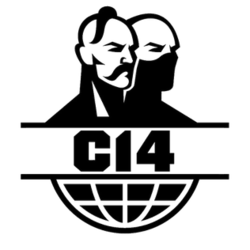S14 (Ukrainian group)
S14, also known as Sich[1] (Ukrainian: С14 (Січ)), is a neo-Nazi[2][3] and Ukrainian nationalist group founded in 2010[4] that gained notoriety in 2018 for being involved in violent attacks on Romani camps.[3][5][6] S14 itself claims that it is only involved in removing illegal Romani camps using only "compelling legitimate arguments."[7]
 | |
| Formation | 2010 |
|---|---|
| Headquarters | 3 Vasylkivska Street, Kiev |
| Location | |
Leader | Yevhen Karas |
Parent organization | Svoboda (former) |
History
S14 began in 2010 as the youth wing of the ultra-nationalist political party Svoboda.[1]
S14 was one of the far-right groups active during the Euromaidan movement (November 2013 – February 2014).[1] They were involved with skirmishes with the violent pro-government supporters known as 'Titushky'.[1]
Early 2018 Ukraine's capital Kiev and S14 signed an agreement allowing S14 to establish a "municipal guard" to patrol the city streets.[8]
On 19 November 2018, S14 and fellow Ukrainian nationalist political organizations—the Congress of Ukrainian Nationalists, the Organization of Ukrainian Nationalists and Right Sector—endorsed Ruslan Koshulynskyi candidacy in the 2019 Ukrainian presidential election.[9] In the election Koshulynskyi received 1.6% of the votes.[10]
Group image
News organization and the Terrorism Research & Analysis Consortium have reported that the number 14 in the group’s name has been seen as a reference to a 14-word slogan coined by American white-supremacist David Lane.[1][8][4][nb 1] But this white-supremacist link is being denied by the group members, they say S14 (as spelled in the Ukrainian alphabet) just resembles the word Sich (Ukrainian: січ) – the name given to the administrative and military centres for Cossacks in the 16–18th century.[1] S14 leader Yevhen Karas has repeatedly denied being a Nazi.[1] According to him his main "confrontations" were with "non-Ukrainian ethnic groups that controlled Ukraine's political and economic forces" (Karas identified Russians, and Jews).[1] (According to him) "We don’t consider ourselves a neo-Nazi organization, we’re clearly Ukrainian nationalists."[1] In May 2018 Hromadske.TV stated "Most of C14's actions do seem to be directed at Russia, or those sympathetic towards Russia".[1] German political scientist Andreas Umland on the other hand claimed (also in May 2018) that S14 "could qualify as neo-Nazi."[1] Radio Free Europe/Radio Liberty reported in June 2018 that members of the group had openly expressed neo-Nazi views.[3]
In 2017, S14 was accused by left-wing anti-war[11][12] activist Stas Serhiyenko of having been involved in his stabbing.[13][8] The day after the attack S14 leader Karas accused Serhiyenko of having supported the 2014 pro-Russian unrest in Kharkiv and the 2014 Russian annexation of Crimea and claimed that the attack was "far from the first, but not the last, attack on the bacilli of terrorism, hidden in the midst of peaceful Ukrainian streets".[14]
In June 2018, S14 gained international notoriety after reports it was being involved in violent attacks on Romani camps.[3][5] After one such alleged attack in May 2018, Kiev Police released a statement it had not receive complaints from Roma for beatings nor violence.[15] S14 itself claims that it does only use "compelling legitimate arguments" to remove illegal Romani camps.[7]
Notes
References
- "A Fine Line: Defining Nationalism and Neo-Nazism in Ukraine". Hromadske.TV. 10 May 2018. Retrieved 2019-02-11.
- "The Neo-Nazis Who Don't Want to Be Called Neo-Nazis".
- Miller, Christopher (14 June 2018). "Ukrainian Militia Behind Brutal Romany Attacks Getting State Funds". Radio Free Europe/Radio Liberty. Retrieved 2019-02-11.
- "C14 aka Sich - Ukraine". Terrorism Research & Analysis Consortium. Retrieved 2019-02-11.
- "Ukraine Roma camp attack leaves one dead". BBC News. 24 June 2018. Retrieved 2019-02-11.
- "SBU opens case against C14 nationalists for detention of Brazilian mercenary – lawyer". unian.info. Ukrainian Independent Information Agency. 18 June 2018. Retrieved 2019-02-11.
- "На Лисій горі в Києві націоналісти розібрали і спалили табір ромів" [On the hill of Lysa Hora in Kiev, the nationalists dismantled and burnt a Roma camp] (in Ukrainian). 112 Ukraine. 22 April 2018. Retrieved 2019-02-11.
- Cohen, Josh (20 March 2018). "Commentary: Ukraine's neo-Nazi problem". Reuters. Retrieved 2019-02-11.
- "Націоналісти визначились з кандидатом у президенти" [The nationalists have been identified with a presidential candidate]. Ukrayinska Pravda (in Ukrainian). 19 November 2018. Retrieved 2019-02-11.
- Zelenskiy wins first round but that’s not the surprise, Atlantic Council (4 April 2019)
- "Волонтер рассказал об одном из "левых" студентов, бросивших тортом в замминистра финансов" [The volunteer told about one of the "left" students who threw the cake to the deputy finance minister]. unian.net (in Russian). Ukrainian Independent Information Agency. 31 August 2016. Retrieved 2019-02-11.
- "Заява Платформа «Старт» про стипендії, наклеп та російський імперіалізм (заява)". rev.org.ua (in Ukrainian). Sotsialnyy Rukh. 7 September 2016. Retrieved 2019-02-11.
- "В Киеве напали на участника "акции с тортом" против отмены стипендий" [In Kiev, a participant of a "cake action" against the abolition of scholarships was attacked]. Strana.ua (in Russian). 23 April 2017. Retrieved 2019-02-11.
- Karas, Yevhen (21 April 2017). "Чергове сафарі на сепарів" [Another safari on separatists]. Censor.net (in Ukrainian). Retrieved 2019-02-11.
- "Крищенко: На Лисій горі під час суботника спалили сміття, а не табір ромів" [Kryshchenko: On the hill of Lysa Hora, garbage was burned during the volunteer clean-up, and not the Roma camp] (in Ukrainian). 112 Ukraine. 24 May 2018. Retrieved 2019-02-11.